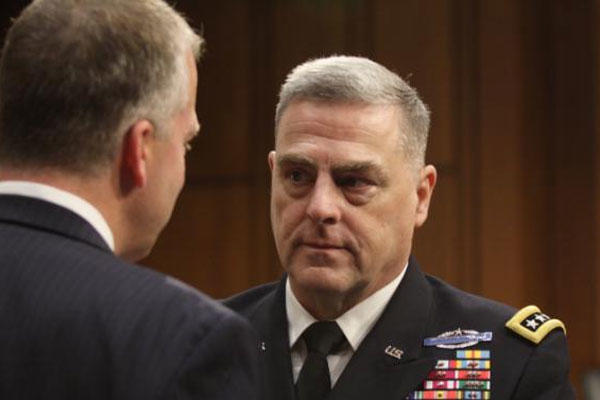The U.S. Army's new chief of staff outlined demanding goals for the active and reserve components on Tuesday to deter growing threats from Russia, China and North Korea.
To meet his readiness goals in a downsizing force, Gen. Mark Milley said he would be calling increasingly on the National Guard and the Army Reserves to bolster the active-duty ranks.
"We are a total Army, we are one Army and we are an Army of almost a million strong, not 490,000" active duty troops, he said. "We are an Army of 19 divisions, not 10 divisions. We are an Army of 60 Brigade Combat Teams, not 32" when the Guard and Reserves are counted, he said.
In a blunt address to the Association of the United States Army's annual meeting, Milley also sought to dispel the "myths" about combat that he said were held by politicians in Washington, D.C., and were hampering the Army's mission.
The myths, ranging from over-reliance on Special Operations units to a preference for stand-off weapons, were hindering effective deterrence, Milley said in singling out Russia's increasing aggression in Europe and the Middle East.
"Nobody, not me or anyone in this room, wants an armed conflict with Russia," he said, "but the U.S. Army must be prepared as part of joint force, and an international force, to further deter Russian aggression."
Milley said he could not predict what Russian President Vladimir Putin would do next, "but I do know that Russia has considerable capability. It's certainly apparent to me that Russia considers the U.S. and NATO a direct threat to its core interests and seems to acting accordingly."
Since taking over as chief of staff in August from Gen. Ray Odierno, Milley has repeatedly conveyed his general concerns about readiness and Washington's ignorance of the realities of war, but he gave his most candid assessments to date at the AUSA meeting.
Milley said he wanted to dispel "a few myths, a few misconceptions about war that often creep into the dialogue, especially inside the Beltway. My experience is that they're often promulgated by those who have never actually experienced the blood, the sweat, the tears of war."
"First, I don't know how many times I've heard that wars will be short. I doubt we thought we'd still be in the Balkan, Afghanistan and Iraq when we first started in the places that I've been," he said.
However, "wars are funny things. They have a logic all their own" and do not conform to the timetables of policy-makers, Milley said.
"Another myth is that wars can be won from great distances through the use of advanced technologies which give us stand off from the air or sea," he said.
Milley called the notion "very seductive. It posits that wars can be won on the cheap in terms of our own blood. Unfortunately, after the shock and awe comes the march and fight."
"Another and, perhaps, more recent myth is that Special Forces can do it all and that America needs only an elite rapid reaction force to battle terrorists and we will be good to go," he said.
U.S. Special Operations units are the best in the world, Milley said, but "to prevail in war takes so much more than killing selected terrorists with drone strikes and small unit raids, which is nothing more than attrition warfare, a dressed up version of body counts."
For the chief of staff, the most consuming myth was that the nation can risk preparing for some contingencies, but not others.
In Iraq, American troops rolled to Baghdad in a month, "but we were caught very short in the ensuing years of insurgency and terrorism," Milley said. The price was measured in lives lost, as the U.S. forces struggled to develop a counter-insurgency strategy, he said.
He read off a list of names of soldiers and Marines who were killed in battles going back to Bunker Hill because their leaders were unprepared. He ended with the name of a private first class killed in Iraq "the day after we declared 'Mission Accomplished.'"
--Richard Sisk can be reached at Richard.Sisk@military.com.






























